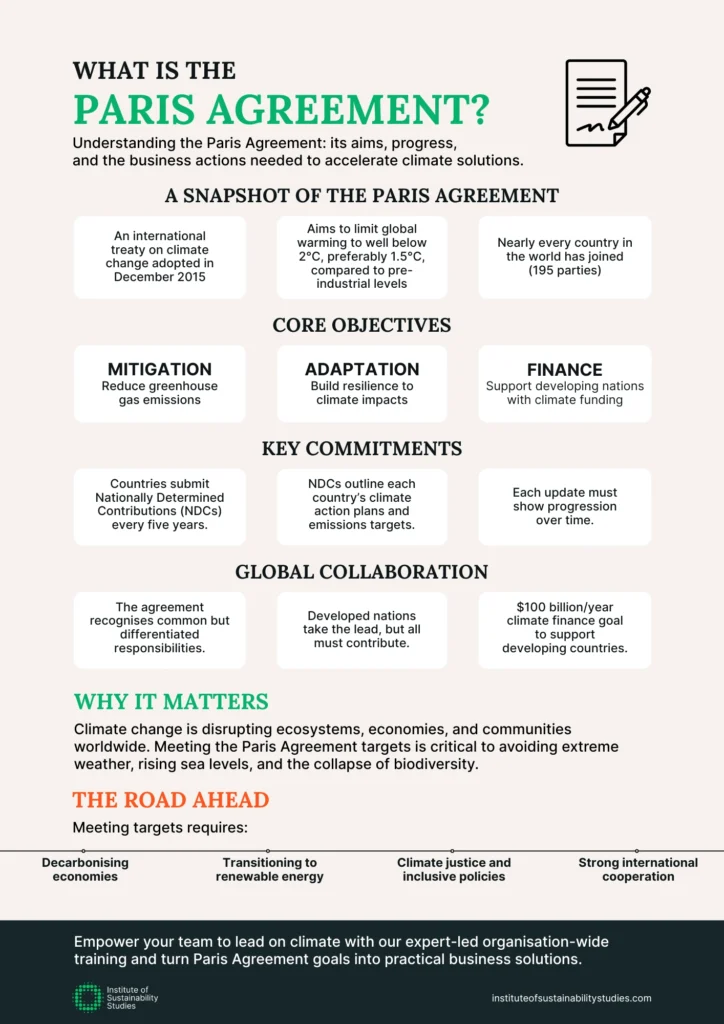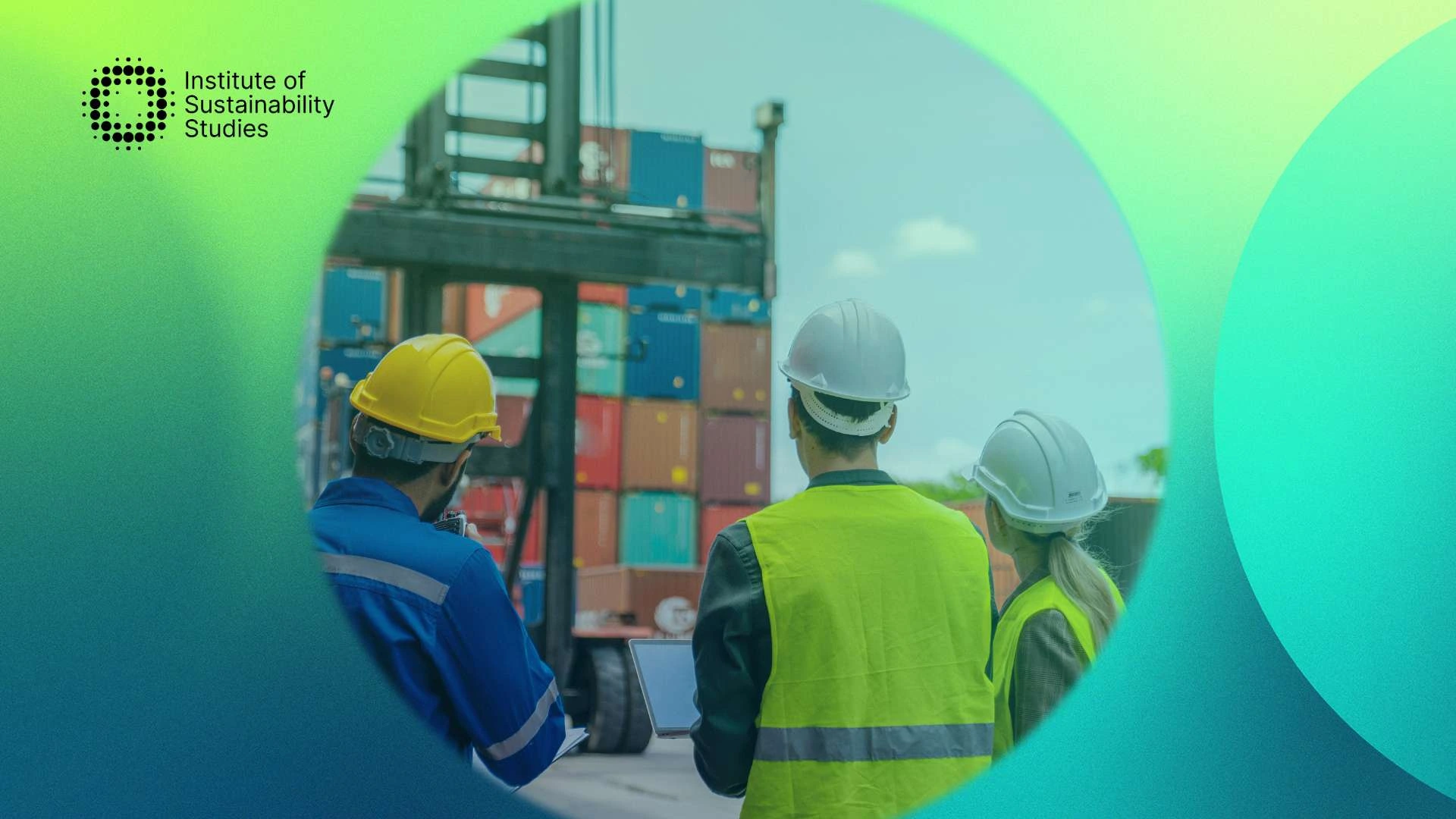The Paris Agreement, adopted in 2015, represents a defining moment in the global fight against climate change. For the first time, nearly all nations united under a common framework to limit global warming, build resilience, and support the transition to a low-carbon future.
With its emphasis on mitigation, adaptation, and climate justice, the Agreement sets the foundation for coordinated climate action at an unprecedented scale. However, achieving these ambitious goals requires more than political will. It calls for active participation from businesses, governments, and communities worldwide, with business sustainability strategies serving as a cornerstone for driving lasting change.
What is the Paris Agreement?
The Paris Agreement is a landmark international treaty adopted in December 2015 at the 21st Conference of the Parties (COP21) to the United Nations Framework Convention on Climate Change (UNFCCC). It represents a global commitment to combat climate change by limiting global warming and fostering a sustainable, low-carbon future.
Key Goals of the Paris Climate Agreement
- Limit global warming: Keep the rise in global average temperatures well below 2°C above pre-industrial levels. In addition, efforts should be pursued to limit warming to 1.5°C, as scientists agree this would significantly reduce the risks and impacts of climate change.
- Enhance climate adaptation: Strengthen countries’ ability to adapt to the adverse effects of climate change and foster climate resilience while ensuring sustainable development.
- Finance flows to support low-carbon development: Ensure financial resources are directed toward supporting mitigation (reducing emissions) and adaptation efforts, particularly for developing nations that face greater challenges.
Key Features of the Paris Agreement 2015
Below are the main features of the Paris Agreement on climate change.
Nationally Determined Contributions (NDCs)
Each participating country must submit a climate action plan, known as an NDC, outlining how they will reduce greenhouse gas emissions. These plans are updated every 5 years to reflect increased ambition.
Global stocktake
Every 5 years, a collective assessment is conducted to measure global progress towards meeting the Agreement’s goals. This process informs countries to ramp up their commitments if necessary.
Climate finance
Developed nations pledged to mobilise $100 billion annually by 2020 to support developing countries’ efforts in mitigating and adapting to climate change. This target is under continuous review to ensure its effectiveness.
Transparency and accountability
The Agreement establishes a robust system to monitor, report, and verify countries’ emissions and climate actions.
Achievements and progress so far
Since the adoption of the Paris Agreement in 2015, significant progress has been made in global climate action, though challenges remain. Here are some key achievements:
- Nationally Determined Contributions (NDCs): Nearly all participating countries have submitted updated NDCs outlining their climate action plans. These commitments aim to reduce greenhouse gas emissions and adapt to climate impacts, with many countries pledging more ambitious targets over time.
- Net-zero commitments: Over 140 countries, including major emitters like the US, China, and the EU, have set net-zero targets for mid-century. For instance, the European Union aims for net-zero emissions by 2050, while China has committed to becoming carbon-neutral by 2060.
- Growth in renewable energy: The deployment of renewable energy sources, such as solar and wind, has accelerated globally. Between 2015 and 2022, renewable energy capacity grew by nearly 90 percent, highlighting a global shift away from fossil fuels.
- Climate finance: Developed countries have collectively mobilised billions in climate finance to support developing nations. While the annual target of $100 billion has not yet been fully met, funding for adaptation, mitigation, and green technology continues to increase.
- Climate action from non-state actors: Businesses, cities, and civil society have played a significant role in advancing climate goals. Initiatives like the Race to Zero Campaign have mobilised thousands of companies and local governments to commit to net-zero emissions.
While progress has been made, the gap between current action and the 1.5°C target remains significant. Strengthening global commitments and ensuring accountability will be critical to achieving the Paris Agreement goals.
For example, the Trump Paris Agreement exit overshadows this progress. By withdrawing the US, one of the world’s largest carbon emitters, the move undermines global progress, shifting a significant burden onto other nations and diminishing the momentum needed to meet critical climate goals.
Final thoughts
The Paris Agreement has laid the groundwork for a sustainable and resilient global future, inspiring nations to act with urgency and ambition. While progress has been made through net-zero commitments, renewable energy expansion, and increased climate finance, significant challenges remain to limit warming to 1.5°C and bridge the action gap. Businesses have a pivotal role to play in this global effort, as they possess the innovation, influence, and resources to accelerate climate solutions.
To truly align with the goals of the Paris Agreement, businesses must prioritise sustainability within their operations and value chains. Sustainability education is vital to equip professionals with the necessary knowledge and tools is essential to drive this transformation. Our sustainable business course offers the expertise needed to implement impactful strategies, measure progress, and contribute to a greener, more resilient future. By fostering a workforce committed to sustainability, businesses can truly become catalysts for change.











